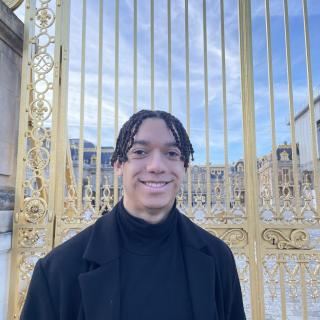 December poses the perfect opportunity to curl up by a fire with a good book, and if you need a recommendation, you have come to the right place! Our December Alum of the Month, J. Sydney Jones (Vienna 1968-69), is the author of twelve books, including four critically acclaimed installments of the Viennese Mystery series: The Empty Mirror, Requiem in Vienna, The Silence, and The Keeper of Hands. Read on to learn how studying and living in Austria inspired him.
December poses the perfect opportunity to curl up by a fire with a good book, and if you need a recommendation, you have come to the right place! Our December Alum of the Month, J. Sydney Jones (Vienna 1968-69), is the author of twelve books, including four critically acclaimed installments of the Viennese Mystery series: The Empty Mirror, Requiem in Vienna, The Silence, and The Keeper of Hands. Read on to learn how studying and living in Austria inspired him.
IES Abroad: What led you to choose the IES Abroad Vienna program?
JSJ: I studied German [at the University of Oregon in Eugene], but did not feel proficient enough to study totally in that language. For me, IES Vienna was a good fit as you could study both in English and German. However, I must confess to a degree of cultural illiteracy as a 20-year-old. When picking the program, I was not quite in the benighted stage of confusing Vienna with Venice or Austria with Australia, but pretty close.
Interestingly, I clearly remember dreaming about a strange little shop that sold all manner of articles from tobacco to four-color magazines to salt months before going to Vienna. Once there, I discovered the Tabak-Trafik was an exact fit for my dream. Had I read about these shops somewhere? I would rather think that my Vienna decision was fated, or at least the most serendipitous choice of my life.
IES Abroad: How did studying in Vienna influence you, personally and professionally?
JSJ: Outside of my family, IES Vienna was the single biggest influence in my life. It made me what I am today, it opened the world for me, it allowed me to see possibilities I never knew existed. It was in Vienna that I decided to become a writer. I stayed on for a number of years and learned my craft there and also found a subject that I have mined over and over in nonfiction and fiction: the amazing renaissance of Vienna 1900. That culture and epoch created the modern sensibility through the works of such seminal artists, writers, and thinkers as Gustav Klimt, Oskar Kokoschka, Egon Schiele, Otto Wagner, Adolf Loos, Arthur Schnitzler, Sigmund Freud, Gustav Mahler, Arnold Schoenberg, Ludwig Wittgenstein, and many others. Vienna 1900 was also the breeding ground for such future tyrants as Trotsky, Stalin, and Hitler, all of whom also spent time in the city.
My Hitler in Vienna, 1907-1913: Clues to the Future began this exploration, juxtaposing the largely Jewish-led ferment in culture against the early down-and-out years of Hitler. I went on to write guides, Vienna Inside Out and Viennawalks, as well as the World War II thriller, Time of the Wolf, the four books (and counting) of the "Vienna Mystery" series set in Vienna 1900, and a new series, the "Sam Kramer" books set in post-Cold War Vienna of the 1990s--all of them are inspired by my researches and years of living in Vienna.
It was also later in Vienna that I began teaching English as a Foreign Language. I began with the Austro-Amerika Institut and worked as an independent contractor for various other language schools in Vienna. My last gig was with the UNHCR running the English language training at the refugee holding camp in Traiskirchen. An amazingly exciting time. I wrote a novel inspired by that experience, A Distant Border, about a teenage Rumanian boy who escapes to the West in the early 80s via Traiskirchen. It is one of a few unsold books I am fond of, and now I am reading it to my son and realize it really is not an adult novel at all, but instead a young adult book. I guess it is time to re-package that one.
IES Abroad: How many times have you returned to Vienna after studying there? How long were you there, and what has changed?
JSJ: I attended IES Vienna in 1968-69, and then returned to the States to finish my education. But I was back by the end of 1970 and stayed on in Vienna, and in other places in Europe (Paris, Florence, Donegal, Molyvos), until the late 1980s. I was in Vienna long enough to witness Vienna's amazing transformation from its faded elegance when I was a student to its very uptown look now.
When I lived there as a student in 1968-69, my landlady rationed my baths to once weekly; there were roughly torn squares of the daily Kurier newspaper dangling on a string from a bent nail in the clo to be used as toilet paper; beer, of a delicious species I had never known existed, was fifteen cents the pint; a good schnitzel cost less than a buck; ten p.m. was considered late; Bill Haley and His Comets still had pride of place in juke boxes. It was love at first sight. Vienna in the Sixties and Seventies had a rough-hewn quality that is missing now. I liked it better as the down-at-heel dowager it once was.
IES Abroad: Do you keep in touch with anyone from your IES program?
JSJ: My best friends come from that time. I still see Tom Ovens and Jim Barry on a regular basis. Tom has proven a great reader and editor, and I always run my Vienna books by him. He has also researched and published via Lulu annotated and illustrated volumes of my Vienna Mystery books. Linda Maffei--another IES alum-- and I were married for a decade and had a daughter together, who, when becoming a junior in college, also went off for a year in Europe to study. I remain in contact with several other friends and fellow classmates from Vienna IES via e-mail and Facebook--Cordell Ho, and Harry and Barb Boyce, among others. And here is one for coincidence: the drama teacher at my son's Montessori school is Robin Pulse, another IES'er from 1968-69.
IES Abroad: When did you discover you had a passion for writing? Did any of your IES Abroad professors or courses inspire you?
JSJ: Vienna was my Paris. I went there expecting to become a lawyer and left knowing I was a writer. I have already mentioned the trajectory of my career as a writer, and this has been very much inspired by simply living in Vienna, being in a cultural milieu that truly honors the arts. But I must also thank the instructors I worked with during that year who helped turn a callow Ami into a thinking and fairly well-rounded Mensch. I studied Russian literature, modern drama, art history, and philosophy that year, and from each of these disciplines I grew, saw bigger horizons, and learned that learning was never-ending. Wittgenstein was a revelation. I imagine a ten-year-old Wittgenstein in short pants in my third Vienna Mystery, The Silence.
IES Abroad: Have you always been interested in Austrian/Viennese history?
JSJ: A college course in modern European history excited me about history in general, Central European in specific. My years in Vienna only intensified such an interest. I never thought of Vienna as a living museum, but the age of the place seeps through the skin like osmosis. It's in the very stones of the city.
IES Abroad: Are there any details in your books that were directly inspired by your study abroad experience?
JSJ: Basic Law, the first of the Sam Kramer novels (coming out in 2014), draws on my experiences in Vienna not only as a student, but also later while I was working there as a fledgling writer and freelance journalist, and also piecing together a living at the International Atomic Energy Agency and as an ESL teacher. My landlady from 1968-69, has made appearances in a couple of my novels; I also have written a series of essays of living in Cold War Vienna, posted first in my blog, Scene of the Crime, and then collected for a memoir, The Man in the Tower. Nine of my fifteen published books are informed in one way or another by my Vienna experience.
IES Abroad: Walk us through a typical day in your job. What are you working on these days? What’s in store for the future?
JSJ: I get up at about seven and get my nine-year-old son off to school. Then it's back home to my office right across the hall from my bedroom to work first on my fiction. Currently that is book number 6 in the Vienna Mystery series (book 5 comes out the spring of 2014). I try to get in an hour or 90 minutes of tennis midday, sometimes with my wife, sometimes with a tennis buddy, then come back, have lunch, get to work on the freelancing stuff that my wife and I do together, pick up the bairn from school, more freelance stuff, and then teach English and writing several nights a week at the local community college. It's a busy, full life. I write about 300,000 words of freelancing annually so I can afford the luxury of doing my own 100,000 of fiction.
Future books include more installments of the Vienna Mysteries. The first in the series takes place in 1898 and features the artist Klimt, accused of killing one of his models. Each of the books features some luminary of the time--Mahler, Mayor Lueger, Schnitzler, Archduke Franz Ferdinand--for whom my fictional protagonist, lawyer and private inquiries agent Karl Werthen, along with Doktor Hanns Gross (real-life father of criminology) come to the rescue. I am in 1902 in book six, and hope to take the series up to the time of Gross's death in 1915.
I also just published a thriller set in Nuremberg right before and during the 1945 War Crimes Trial, Ruin Value: A Mystery of the Third Reich, and the response I have been getting from readers and reviewers alike makes me think there is a series or at least a sequel there.
IES Abroad: What are your next travel plans?
JSJ: My wife, I, and our son went to Hong Kong last Christmas and stayed for a few weeks. My wife is from Hong Kong and it was a wonderful trip and a real revelation for me. I had never traveled in Asia before. I would love to go back. Also, I very much want to introduce my son to Vienna. Can't say when, though.
IES Abroad: What advice would you give to students considering study abroad?
JSJ: First of all, do it! It can be life-altering. I think every young person around the world should have to spend a year in another country. It should be a rite of passage.




